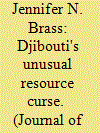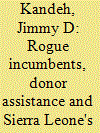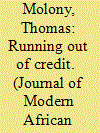|
|
|
Sort Order |
|
|
|
Items / Page
|
|
|
|
|
|
|
| Srl | Item |
| 1 |
ID:
087362


|
|
|
|
|
| Publication |
2008.
|
| Summary/Abstract |
Monitoring and evaluation (M&E) are sensitive issues in relations between donor agencies and recipient governments, especially in a time when the responsibility for implementing aid activities is shifting towards recipients. This paper deplores that, so far, donors and recipients have adopted an overly technocratic approach to M&E, largely disregarding broader institutional and systemic issues. Using case study material from Rwanda, we illustrate that assessments regarding the quality of a country's M&E efforts may differ sharply depending upon one's perspective. At the core of the matter is 'the denial of politics', one of the most serious flaws in the new aid paradigm promoted in the OECD's 2005 'Paris Declaration'. We argue that while a narrowly defined technocratic vision of M&E may seem 'politically neutral', in fact it may jeopardise M&E's functions of 'accountability' and 'feedback'. This can eventually undermine the effective implementation of some of the key principles of the 'new aid approach'.
|
|
|
|
|
|
|
|
|
|
|
|
|
|
|
|
| 2 |
ID:
087359


|
|
|
|
|
| Publication |
2008.
|
| Summary/Abstract |
An extensive literature on the 'resource curse' posits that abundant natural resources 'curse' countries possessing them with negative economic, social and political externalities. Usually, scholars identify tangible resources like oil, diamonds or timber, rarely questioning whether other kinds of resources might have the same impact, and under what conditions. This paper examines how little-studied Djibouti's non-tangible resources - geo-strategic location and aid-inspiring poverty - have produced 'curse' effects; with an economy dominated by US and French military spending (and concomitant aid) and rents on trade passing to and from Ethiopia, tiny Djibouti suffers from this curse. It draws four conclusions. First, resource curse effects can derive from non-traditional sources. Second, leaders' policy decisions matter at least as much as the presence or absence of resources. Third, advanced countries' spending patterns in their less-developed allies often produce unintended consequences. Finally, even tiny countries can provide scholars and policy makers with new insights.
|
|
|
|
|
|
|
|
|
|
|
|
|
|
|
|
| 3 |
ID:
087361


|
|
|
|
|
| Publication |
2008.
|
| Summary/Abstract |
China's engagement with African countries is growing rapidly, spanning trade, investment and development cooperation. Some observers have suggested that poor operating standards among Chinese investors may contribute to the social ills associated with extractive industries and undermine host countries' sustainable development. Drawing on case study data from the copper mining sector in Zambia, this paper argues that the economic and political context surrounding Chinese investment risks undermining the effectiveness of local environmental, social and fiscal regulation. The analysis first explores particular characteristics of large-scale Chinese investment, including the prevalence of state-led financing and the challenges of effectively monitoring overseas Chinese projects. It proceeds to place these characteristics within the host country regulatory context, which in the case of Zambia features significant capacity constraints, political interventionism and a pervasive lack of transparency. The paper argues that, within a weak regulatory setting, Chinese investment may pose significant challenges for effective business regulation. Yet the resulting state-firm dynamics are by no means exclusive to Chinese investment. Rather, it is host country regulatory characteristics, in combination with certain features of investors' corporate governance, that together herald a new set of challenges for business regulation in developing African countries.
|
|
|
|
|
|
|
|
|
|
|
|
|
|
|
|
| 4 |
ID:
087364


|
|
|
|
|
| Publication |
2008.
|
| Summary/Abstract |
The removal of the governing Sierra Leone People's Party (SLPP) from power through the ballot box in 2007 represents a watershed moment in the growth and maturation of Sierra Leone's teething electoral democracy. This is because the peaceful alternation of political parties in power tends to strengthen democracy and nurture public confidence in elections as mechanisms of political change. In contrast to what happened in 1967, when the SLPP derailed the country's first post-independence democratic experiment by orchestrating a military coup after losing power in parliamentary elections, the SLPP in 2007 found itself isolated both internally and externally, and could rely neither on the support of a restructured army and police nor on external patrons like the United Kingdom which, among other things, suspended budgetary support for the government pending the satisfactory conclusion of the elections. The emergence of the People's Movement for Democratic Change (PMDC), whose membership consists largely of disaffected former SLPP members and supporters, and the electoral alliance forged between the PMDC and the All People's Congress (APC) in the presidential run-off, doomed any chance the SLPP may have had of holding on to power. The elections were referenda on the SLPP, which lost both the presidency and the legislature because its rogue leadership squandered the goodwill of the public, misappropriated donor funds with impunity, and failed to deliver basic social goods and services.
|
|
|
|
|
|
|
|
|
|
|
|
|
|
|
|
| 5 |
ID:
087366


|
|
|
|
|
| Publication |
2008.
|
| Summary/Abstract |
Poor farmers often lack credit to purchase agricultural inputs, and rely on their buyers to provide it. This paper considers the effects of mobile phones on traders of perishable foodstuffs operating between Tanzania's Southern Highlands and Dar es Salaam's wholesale market, with a particular focus on the importance of credit in the relationship between potato and tomato farmers and their wholesale buyers. It argues that the ability to communicate using these new information and communication technologies (ICTs) does not significantly alter the trust relationship between the two groups. It also suggests that farmers, in effect, often have to accept the price they are told their crops are sold for - irrespective of the method of communication used to convey this message - because their buyers are also their creditors. In this situation, many farmers are unable to exploit new mobile phone-based services to seek information on market prices, and potential buyers in other markets. Doing so runs the risk of breaking a long-term relationship with a buyer who is willing to supply credit because of their established business interaction. It is suggested that, under a more open system than currently exists in Tanzania, mobile-payment ('m-payment') applications should target these creditor-buyers as key agents in connecting farmers to the credit they so often require.
|
|
|
|
|
|
|
|
|
|
|
|
|
|
|
|
| 6 |
ID:
087367


|
|
|
|
|
| Publication |
2008.
|
| Summary/Abstract |
Drawing on a twenty-year study, we examine the effects of HIV-related illness and death on villagers in Malawi during 2006. Contrary to unidimensional images of an AIDS disaster, we found people striving for normality - trying to control the abnormal circumstances of the rising toll of HIV-related illness and death. Just over 40% of the sample households had experienced at least one death (certainly or probably) related to HIV, but only about 10% were found to be suffering acute or serious livelihood stress due to HIV deaths. The ability to deal with illness and death depended on households' pre-existing characteristics, particularly income level, and, critically, on their placement in the extended matrilineal family. But increasing pressures on an already severely stressed population, and failure of the current 'community-based' approach to deliver needed help, argue for more concerted efforts to link the HIV epidemic to broader-based development.
|
|
|
|
|
|
|
|
|
|
|
|
|
|
|
|
|
|
|
|
|